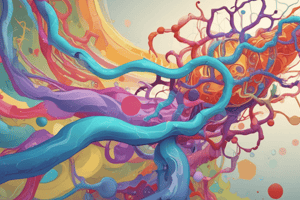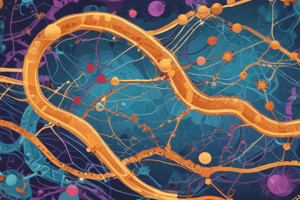Podcast
Questions and Answers
Where does translation occur in the cell?
Where does translation occur in the cell?
- Mitochondria
- Cytoplasm (correct)
- Nucleus
- Endoplasmic Reticulum
What initiates the formation of the polypeptide chain during translation?
What initiates the formation of the polypeptide chain during translation?
- Ribosome binding to mRNA
- Binding of nucleotides
- Formation of the cell membrane
- Anticodons on tRNA (correct)
What is the role of nucleotides during DNA replication?
What is the role of nucleotides during DNA replication?
- To pair with new nucleotides (correct)
- To provide energy for the process
- To separate the DNA strands
- To form polypeptide chains
During what phase does DNA replication occur?
During what phase does DNA replication occur?
What happens to the two strands of DNA during replication?
What happens to the two strands of DNA during replication?
What is a primary function of the cell cycle?
What is a primary function of the cell cycle?
What are the two major phases of the cell cycle?
What are the two major phases of the cell cycle?
How are the nucleotides in a new strand of DNA determined during replication?
How are the nucleotides in a new strand of DNA determined during replication?
What is produced as a result of DNA replication?
What is produced as a result of DNA replication?
What occurs during the cell's interphase?
What occurs during the cell's interphase?
Flashcards
Translation location
Translation location
Translation occurs in the cytoplasm of a cell.
Polypeptide initiator
Polypeptide initiator
Anticodons on tRNA molecules initiate polypeptide chain formation during translation.
DNA replication nucleotides
DNA replication nucleotides
New nucleotides pair with existing nucleotides in the template strand during DNA replication.
DNA replication phase
DNA replication phase
Signup and view all the flashcards
DNA strands in replication
DNA strands in replication
Signup and view all the flashcards
Cell cycle primary function
Cell cycle primary function
Signup and view all the flashcards
Cell cycle phases
Cell cycle phases
Signup and view all the flashcards
New strand nucleotide determination
New strand nucleotide determination
Signup and view all the flashcards
DNA replication product
DNA replication product
Signup and view all the flashcards
Interphase activity
Interphase activity
Signup and view all the flashcards
Study Notes
Translation
- Translation takes place in the cytoplasm after mRNA exits the nucleus through nuclear pores.
- mRNA binds to ribosomes, where protein synthesis occurs.
- Codons, consisting of three nucleotide bases on mRNA, are matched with anticodons on transfer RNA (tRNA).
- tRNA transports specific amino acids from the cytoplasm to the ribosome-mRNA complex, initiating polypeptide chain formation.
- The translation process continues until the polypeptide chain is fully synthesized.
DNA Replication
- DNA replication occurs during interphase when DNA is housed in the nucleus within chromosomes.
- Each DNA strand separates and serves as a template for producing a complementary new strand.
- Newly paired nucleotides join with existing nucleotides facilitated by enzymes, forming a new DNA strand.
- The nucleotide sequence on the template strand dictates the sequence on the newly synthesized strand.
- DNA replication results in the formation of two identical chromatids connected at a centromere, constituting one chromosome.
The Cell Cycle
- Cell division is essential for growth, development, and the replacement of damaged or dead cells.
- The cell cycle encompasses two primary phases: interphase (non-dividing phase) and mitosis (cell division phase).
- A cell predominantly exists in interphase, where it carries out normal metabolic functions and prepares for division.
Studying That Suits You
Use AI to generate personalized quizzes and flashcards to suit your learning preferences.





